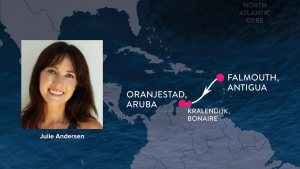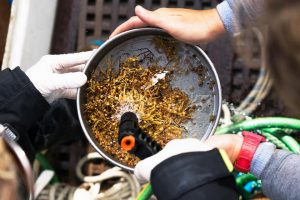I am very excited to be part of the eXXpedition voyage Round the World. It’s an all-female sailing voyage with a scientific research mission to investigate the causes of, and solutions to ocean plastic pollution. Over two years, eXXpedition will circumnavigate the globe through four ocean gyres and the Arctic.
A crew of 300 women will participate in 30 separate legs, and sail 38,000 nautical miles, on board S.V. TravelEdge. The challenging legs sail through some of the planet’s densest ocean plastic accumulation zones to study plastic pollution, with the first few completed since eXXpedition launched October 8 from the UK.
I will join Leg 4 of eXXpedition, sailing from Antigua to Aruba, November 29 – December 8. We will travel to Bonaire, an island with a reef-lined coast protected by a National Marine Park and abundant wildlife. Read official press release HERE.
Why am I joining eXXpedition voyage?
It is critical to help raise awareness about the impact of plastic on human health.
My hope, taking part in this all-female science-based sailing expedition, is to shift how people think and act when it comes to using and regulating plastic.
Over the last several years, I have learned frightening things about plastic:
- Plastics contain dozens of toxins like bisphenols, e.g., BPA, BPS, BPF…, phthalates and other plasticizers (Plasticizers are the added chemicals that give plastic their different characteristics).
- Plastic is a complicated material. Unlike uniform substances, such as glass, wood or aluminum, plastic can be made hundreds of ways using different chemical recipes (depending on the physical properties of the end product desired).
- Plastic is a perfect sponge for hydrophobic compounds and can absorb additional toxic chemicals in its surroundings.
- There are studies that make a parallel link between the chemicals used to make plastic and the health factors that affect reproductivity, obesity and neurological development.
- Studies also find that chemical toxins used to make plastic are passed from mother to child in utero, and newborns have been recorded with high concentrations of these toxic chemicals.
Research conducted on Leg 3 of the eXXpedition voyages. Photo: Sophie Dingwall Scarisbrick
Some argue these studies are not fully conclusive. Does that mean we should wait for a 5-,10- or 20-year study to prove the toxicity of plastic while people and animals get sick beyond repair? I would argue it’s foolish to gamble our health and well-being.
As we develop new regulations to address plastic worldwide, heavy consideration must be placed upon plastic’s potential for large-scale harm and negative effects. This should account, not only existing human and environmental health, but also for the health of those unborn.
PLEASE DONATE TO PLASTIC OCEANS



Trackback: StealthEX crypto exchange
Trackback: auto detailing
Trackback: ร้านทำเล็บเจลใกล้ฉัน
Trackback: wave vape
Trackback: Bobs SEO
Trackback: ทางเข้าpg
Trackback: tga168
Trackback: ทดลองเล่นสล็อต pg
Trackback: ทัวร์แคนาดา
Trackback: lazywin888
Trackback: จองตั๋วรถทัวร์ออนไลน์
Trackback: โคมไฟ
Trackback: Ricky Casino
Trackback: Karen